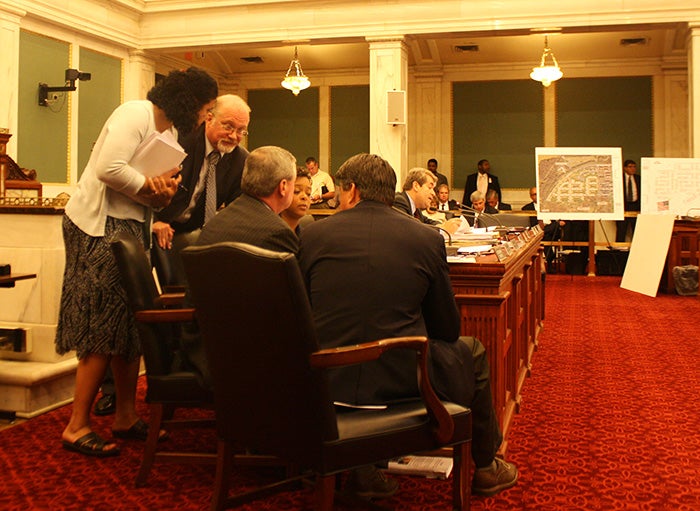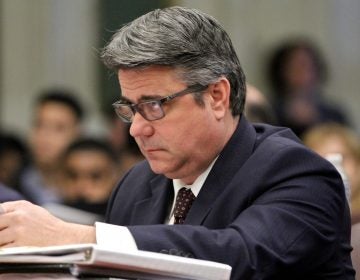New zoning code will take effect without Commission’s finishing touches
Note: In an earlier version of this article, the 50-foot stream buffer was mistakenly identified as one of the Administration’s amendments to the zoning code; it was in fact passed as part of the Code approved by Council. The Administration proposed amending its purposes.
On May 17th, Council President Darrell Clarke introduced a bill into City Council containing the Philadelphia City Planning Commission’s “clean-up” amendments to the new zoning code, which was signed by the Mayor last December and is scheduled to take effect next month.
The bulk of those amendments fixed typos, corrected grammatical errors and punctuation, and made small changes to maps, charts, and illustrations. They were intended to clarify the code and improve its “ease of administration,” according to Eva Gladstein, deputy director of the Planning Commission. The bill, No. 120431, was scheduled for a Rules Committee hearing on June 12th.
But a few of the amendments went beyond the humdrum, and were seen by some in City Council and the development community as unwarranted changes to the code as it was approved by Council last year. Gladstein freely admits that a few of the amendments were more than grammatical.
Seeing that the Commission was making some recommendations that were arguably policy decisions, Development Workshop, a loose group of architects, lawyers, and developers, did two things. Craig Schelter, a spokesman for the group, raised objections to those more substantial amendments, and then began talking to Council members about proposing a separate set of amendments that Development Workshop wanted to see.
“We felt that when the Planning Commission … took up Bill 120431, that there were seventeen policy issues that were in the changes,” Schelter said. “And that if they were not going to consider any recommendations on those … we were going to approach Council and say, ‘Look, these are policy – this is not clean-up.’ So then, if the Commission can raise policy issues, so can the development community. That was the approach that we took.”
That approach worked. On May 24th, Councilmen Bobby Henon and Bill Green introduced a bill, No. 120484, containing a handful of amendments that reflected concerns raised by Schelter and others. It removed the maximum parking limit for development projects and delayed the effective date of the stream buffer map, to name two of the more substantial amendments.
Schelter had objected to the parking cap on the basis that developers would be unlikely to build more than the bare minimum parking they need—that market forces would essentially protect an excess amount of land from being dedicated to parking. But in an interview with PlanPhilly, he also gave examples of situations in which a developer might have a “legitimate need” to provide more parking than the code allows.
“Nobody is going to build more parking than they have to,” Schelter said, “but there may be drugstore chains—take a CVS or whatever—that want to have as much convenient parking as they can, and if they can get it, they want to be able to build more than the code requires, because that’s part of their whole marketing. … That’s something that should be allowed.”
The Zoning Code Commission had instituted the parking cap in order to “Encourage the efficient use of land by avoiding excessive amounts of land being devoted to parking and thus unavailable for other productive uses.”
Councilman Bill Green shares Schelter’s view, saying that the market will dictate the “highest and best use” of land in the city, and that the parking cap is unnecessary.
“I just think that seems like a silly thing to regulate, given all the other issues we have in the City,” Green said.
Regarding the stream buffer amendment, Schelter said the Planning Commission had taken controls developed specifically for the Wissahickon Watershed and simply applied them to other waterways throughout the city without considering the particular conditions of those areas. He said that in some cases the stream buffer will unduly hamper development, despite the Commission expanding the allowable industrial uses within that buffer.
Gladstein said the Commission extended the reach of the stream buffer citywide because it felt it “met the purposes of the zoning code as stated in the Open Space and Natural Resources chapter.”
“There were a variety of reasons that we thought this was a good public policy,” Gladstein said.
The Henon/Green bill was never scheduled for a hearing, presumably because there wasn’t enough time left before Council’s summer recess. Instead, the Councilmen decided they would try to get their amendments added to the Administration’s bill during the June 12th Committee hearing.
Eva Gladstein said that after the Henon/Green bill was introduced, the Planning Commission met with City Council staff to discuss all of the proposed amendments.
“[Henon’s] staff reached out to us after introduction,” Gladstein said. “We met with City Council staff to go over our clean-up amendments in great detail … and agreed to a number of changes to our amendments which they thought would be difficult or where Council would need more time. … Based upon that conversation, we felt that Council would move forward with the clean-up amendments that were agreed to and weren’t causing any potential concern. And we knew that they might also bring up some of the recommendations from the Henon bill.”
The Rules Committee hearing on June 12th took place during the climax of City Council’s budget negotiations, a day before Council struck a deal to delay Mayor Nutter’s Actual Value Initiative (AVI). As the Committee members began to discuss the Administration’s proposed amendments with Gladstein and Commission Chairman Alan Greenberger, it became clear that they weren’t ready to commit to all of them, and didn’t have the time they wanted to review the recommendations.
Committee Chairman Bill Greenlee explicitly objected to the Commission’s characterization of some of the changes as “clean-up.” At the same time, the Committee discussed adding the Henon/Green amendments into the bill, and ultimately decided to do so. Before taking a vote, Greenlee decided to put the hearing on hold and continue it the following morning.
Gladstein said the Commission met briefly with Councilmen Green and Henon after the hearing was paused, and “stated what we thought the concerns were and made some other suggestions.”
“They just expressed to us that they felt very strongly that those particular amendments [in the Henon/Green bill] had to go through right away, immediately,” Gladstein said.
Bill Green said the Commission made it clear to Council that at least one amendment in the clean-up bill was a FEMA regulation required by the Federal government, and had to take effect with the new code. When the Committee reconvened the next morning, it quickly voted to recommend a version of the bill containing the amendments proposed by Henon and Green, and with all but the FEMA amendment in the Administration’s bill removed.
“With everything going on, and the focus of Council people on schools and taxes and other stuff, we just felt like it wasn’t appropriate for [the Administration] to give [the clean-up bill] to us at the last minute,” Councilman Green said. “Certainly Council intended to send them the message that they shouldn’t send us stuff at the last minute. That would be a fair conclusion.”
Green said that it is unusual for a Council committee to swap out the contents of one bill for the contents of another, but he is glad it worked the way it did.
“It’s atypical,” Green said. “It’s not typical at all. We were just lucky that they had introduced these amendments.”
What’s revealing about this turn of events is not simply that Council demonstrated an ability to fundamentally alter the contents of a bill that’s in Committee, but also that, when it came down to the short strokes, Council chose to favor the recommendations of the development community over those of the Planning Commission.
How is that community, and Development Workshop in particular, able to get Council’s ear when the Administration can’t?
Craig Schelter says his group’s influence on Council is a function not of any perceived political advantage, but solely of the group’s own doggedness in raising legislative issues. Though the group has neither a website nor a formal list of its members, campaign finance reports don’t suggest its more prominent members give money to Council campaigns in any significant way.
“I think what happens is, we talk to Council staff, and say, ‘Look, we brought this up – this is why we brought it up, and this is what our concern is.,’” Schelter said. “And some Council staff go, ‘Oh, we hadn’t thought about that. What would you do?’ We say, ‘Well, this is what I’d do.’ And it’s not mysterious; it’s just the hard work of reading stuff.”
Gladstein and Green both said that Development Workshop has had some of the most organized and consistent input on legislation throughout the zoning reform process.
Ultimately, Council balked on the Administration’s amendments because it felt it needed more time to consider them, but, Gladstein felt, it didn’t exhibit the same level of scrutiny on the amendments advocated by Development Workshop.
“I’m not surprised,” Gladstein said. “I had hoped it would have been done in sort of a more contemplative manner. Council chose not to—felt they didn’t have the time to spend to look at the amendments we were recommending, the vast majority of which were non-substantive in nature. Although they felt some of them were, and I agree some of them were more than grammatical corrections or whatever. But I don’t think that there was a really full exploration of the impact of these other recommendations on the zoning code.”
Green says Council went with the amendments it did out of “the desire to fulfill the whole purpose of the rewriting of the zoning code, and that is to promote development, to make it predictable, efficient …”
Courtney Voss, an aide to Councilman Henon, echoed that sentiment. “Both Councilman Henon and Councilman Green have a strong interest in and focus on promoting smart development and encouraging growth,” Voss wrote in an email. “The amendments proposed in 120484, and ultimately incorporated into 120431, were amendments that both Councilman Henon and Councilman Green believe to be consistent with these goals.”
Green said that Council would take up the truly technical amendments in the fall, at which point it will also have enough time to discuss the more substantive amendments. He said the timing of the bill’s introduction amid the budget debate is what caused the technical amendments to get dropped.
Some in the planning community have said that the code taking effect with typos and misplaced commas might cause trouble for administering it, but that, more importantly, it doesn’t present the work of the Zoning Code Commission in its best light. Said Kiki Bolender, an architect and chair of the Design Advocacy Group: “[Council] did the City a great disservice in discarding the technical amendments.”
“I think we’ll be back in the fall when there’s a little more space to consider this,” said Eva Gladstein. “Council has been reasonable, and I expect they will be, and will want to kind of put the finishing touches on the zoning code. What we have now is great, it’s new, it’s workable, it’s just—a lot of this was for clarity purposes, for ease of administration. These were all really nuts and bolts changes that L&I plan examiners asked us for, the Law Department asked us for—the Planning Commission when they have to stamp off on plans asked us for this stuff. It’s not hugely impactful, it will just make it much easier to administer the code.”
Contact the reporter at jaredbrey@gmail.com and follow him on Twitter @jaredbrey
WHYY is your source for fact-based, in-depth journalism and information. As a nonprofit organization, we rely on financial support from readers like you. Please give today.






